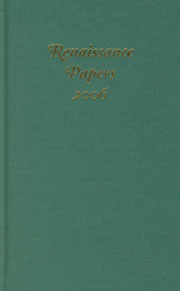Book contents
- Frontmatter
- Contents
- Renaissance Papers
- Youthes Witte: An Unstudied Elizabethan Anthology of Printed Verse and Prose Fiction
- The Power of Association: A Study in the Legitimization of Bianca Cappello through Medici Matriarchal Portraiture
- Vindicta and Vindiciae on the Early English Stage: Imagining Revenge through Huguenot Resistance Theory
- Breaking the Head of the Serpent: Women's Childbirth Prayers in The Monument of Matrones
- “Conquered nations mean nothing in love”: Political Dissent in Propertius's Elegy II.7 and Donne's “Love's Warre”
- Correcting Double Vision in The Comedy of Errors
- Lear's Awakening: Texts and Contexts
- The Power of Fantasy in Middleton's Chaste Maid: A Cost/Benefit Analysis
- Invariant Paratexts in English Dramatic Texts
- Milton and Forgiveness
- Samson at the Fair
- The End of Samson Agonistes
Samson at the Fair
Published online by Cambridge University Press: 12 September 2012
- Frontmatter
- Contents
- Renaissance Papers
- Youthes Witte: An Unstudied Elizabethan Anthology of Printed Verse and Prose Fiction
- The Power of Association: A Study in the Legitimization of Bianca Cappello through Medici Matriarchal Portraiture
- Vindicta and Vindiciae on the Early English Stage: Imagining Revenge through Huguenot Resistance Theory
- Breaking the Head of the Serpent: Women's Childbirth Prayers in The Monument of Matrones
- “Conquered nations mean nothing in love”: Political Dissent in Propertius's Elegy II.7 and Donne's “Love's Warre”
- Correcting Double Vision in The Comedy of Errors
- Lear's Awakening: Texts and Contexts
- The Power of Fantasy in Middleton's Chaste Maid: A Cost/Benefit Analysis
- Invariant Paratexts in English Dramatic Texts
- Milton and Forgiveness
- Samson at the Fair
- The End of Samson Agonistes
Summary
RECENT criticism of Samson Agonistes has been at pains to establish its connection with Greek tragedy, especially that of Euripides, as well as “the emerging tradition of [sixteenth- and seventeenth-century] biblical tragedy” represented by George Buchanan and Hugo Grotius. Joseph Wittreich's new study maintains that the open-ended tragedies of Euripides and “the Senecan tradition in early modern drama,” both informed by “the spirit of interrogation,” share the intellectual habits fostered in the seventeenth century by “the collocation of scriptural texts telling (or alluding to) the Samson story.” The drama that emerged from this matrix, including Milton's, prizes “controversy … and … debate involving all sides of an argument. Doing so, it makes clear that tragedy is less an affirmation than a disavowal of proverbial wisdom.” Reflecting the many views of Samson, which grew more problematic as the seventeenth century progressed, Milton's tragedy may seem to consist, for reader, for protagonist, and for Samson's onstage audience(s) (the Chorus and the other characters) in having to decide among many contradictory interpretations. Beyond that, “everything that serves in the sources and analogues to produce interpretive certainty is also to be found in Samson Agonistes, but it is found in the wrong place, that is, in a place where it multiplies rather than reduces interpretive crisis.”
- Type
- Chapter
- Information
- Renaissance Papers 2006 , pp. 151 - 168Publisher: Boydell & BrewerPrint publication year: 2007

